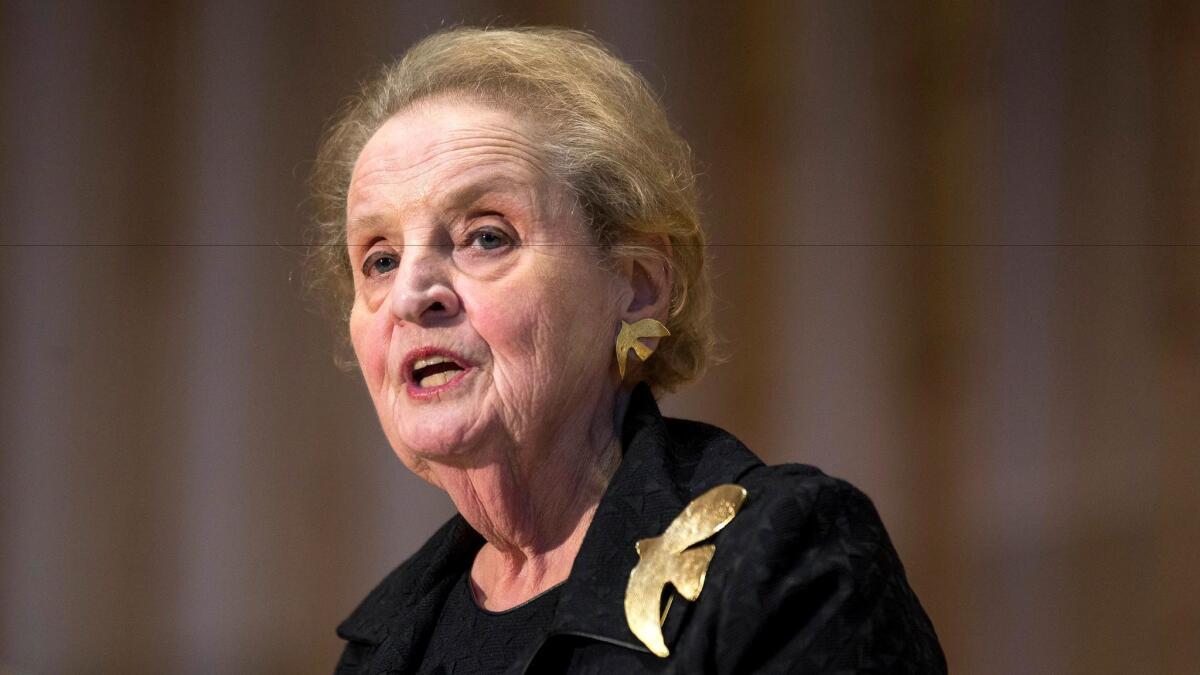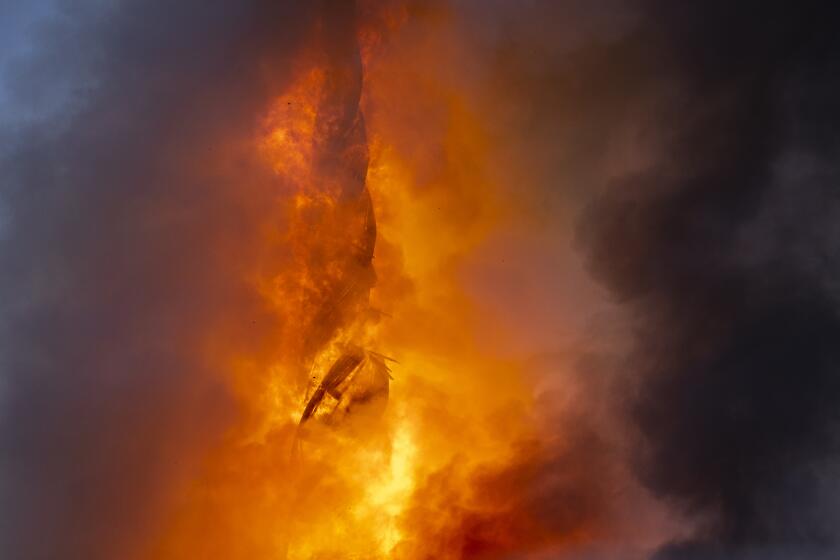Column: ‘Political correctness’ on campus: A free-speech watchdog defends its questionable evidence

My critique this week of a free-speech watchdog’s roster, ostensibly of efforts to silence speakers on college campuses because of their views, has drawn blood. The sponsor of the “disinvitation database,” the Foundation for Individual Rights in Education, struck back Tuesday to defend its work.
FIRE’s willingness to engage in debate, via an article by Ari Cohn, director of its individual rights defense program, is a commendable nod to its stated mission of defending freedom of speech and other such rights on campus. But Cohn’s response actually makes my case that its database, which encompasses 331 “disinvitations” of campus speakers since 2010, including 43 last year, is shallow, overly inclusive, and dependent on anecdotes that don’t support its claim that freedom of speech on campus is in decline.
“It is utterly illiberal to demand that anyone who would like to hear from the speaker not be allowed to do so,” Cohn writes. That’s true, as far as it goes. But many of the cases FIRE includes in its roster don’t involve demands to prevent speakers from speaking at an event or others from attending. As I pointed out in my original column, many involve simply protests or the airing of objections that themselves amount to expressions of free speech.
It is utterly illiberal to demand that anyone who would like to hear from the speaker not be allowed to do so.
— Ari Cohn, Foundation for Individual Rights in Education
Let’s examine Cohn’s defense.
First, Cohn takes issue with my point that even if the database did comprise every attempt to silence speakers or force them to withdraw, it represented a tiny percentage of the tens of thousands of speaking invitations issued every year by America’s more than 4,000 colleges. Therefore it can’t serve as evidence of a trend toward more exclusion. “While there may be 4,000 colleges and universities,” he writes, “the universe of schools to which controversial, big-name speakers are invited is likely significantly smaller.”
That may be so, but FIRE’s universe is fairly inclusive. Its database includes big campuses like Berkeley and the University of Michigan, but also places like Earlham College of Indiana (enrollment 1,019) and Anna Maria College of Massachusetts (1,462). So what’s the real size of the “universe”? Cohn doesn’t say. Nor are all the targets appearing on his list “big name speakers”: They include state legislators, authors of self-published political screeds, and local activists unknown outside their homes and surrounding counties.
The bigger issue, however, lies with FIRE’s claim that its database tracks calls to silence or “disinvite” a speaker. Cohn writes that disinvitation “teaches students the wrong lesson: that keeping anyone on campus from hearing views with which some people disagree, rather than the more difficult task of engaging in critical thinking and refuting those views, is an acceptable and successful tactic.” The truth is that many of FIRE’s cited incidents are nothing of the kind.
I mentioned a couple in my original piece, including a protest against the joint appearance of former Vice President Joe Biden and former House Speaker John A. Boehner at Notre Dame’s 2016 commencement. FIRE listed the event but didn’t cite any evidence of an effort to “disinvite” the speakers. Cohn defends the inclusion by arguing that “some students wrote that they strongly objected to the invitations. Whether this is an implicit call for the revocation of the invitations is a matter upon which reasonable minds can disagree.”
But there can be no disagreement about the letter Cohn cites. It says, “We do not wish to endorse or refute either awardees’ worthiness to receive this honor, but simply call on dissenters of the University’s decision to acknowledge the importance of all Catholic Social Teachings, not simply those they believe are the most important.” In other words, it doesn’t come close, even implicitly, to calling for disinvitation — indeed, it explicitly disavows any such intention. Why is this episode on FIRE’s list?
There are other such examples. Appearances by former Secretary of State Madeleine Albright at Scripps College and Syracuse University made the database. But neither seemed to involve a call for disinviting her. At Scripps, her commencement appearance inspired a commentary in the campus newspaper about her supposed role in fostering genocide; but that free expression of opinion should hearten, not disturb, the people at FIRE. At Syracuse, FIRE’s evidence for “disinvitation” is a report of a small protest outside the hall while Albright was speaking inside. How is that a “disinivitation attempt”?
Cohn takes issue with my argument that commencement speakers should be distinguished from those invited to participate in a campus discussion or panel or give a substantive talk. My point was that a college’s invitation to address commencement confers an implied institutional imprimatur on the speaker’s career or views. That’s especially so when it comes packaged with an honorary degree, as is typically the case. Under the circumstances, the selection of a commencement speaker should be subject to the most vigorous debate and even reconsideration by the campus community.
Cohn writes, “Commencement speakers are generally invited because they have a message to students that would be valuable as they move forward with their lives, often drawing upon their own histories and experiences.” Uh-huh. Would that the average commencement keynote met this high standard. But I’ve been to a few such events, and I know, as I bet Cohn does too, that his Pollyanna-ish statement could have come right out of a college press release.
Finally, Cohn disputes my assertion that a speaker’s fitness to appear on campus at all should be a legitimate topic of discussion, debate, and reconsideration. He writes: “Those extending campus speaking invitations are surely tasked with determining from whom they would like to hear. … Once the inviting party has determined that they would like to hear out a particular speaker, it is certainly not the place of others on campus to determine for them whether or not such a speaker is ‘qualified.’”
Here he begs an important question. “Tasked” by whom? At many campuses, almost anyone can invite a speaker, provided that a free classroom or hall can be found for the event. Surely not everyone tendering an invitation is doing so in the name of the university. Judgments of who’s “qualified” to speak at a campus venue are made all the time on virtually every campus. Why any one individual’s decision to offer a platform to any speaker should necessarily be the last word, immune from criticism, objection, or revocation, is a mystery, and Cohn doesn’t solve it.
Keeping an eye on efforts to suppress free speech on college campuses is a worthy calling. But FIRE’s assertions that such efforts are on the rise — indeed, that they “set a record” in 2016 — can’t survive scrutiny, at least not based on the evidence it provides. Anecdotes can be useful, but not when they deflate at the slightest poking.
Keep up to date with Michael Hiltzik. Follow @hiltzikm on Twitter, see his Facebook page, or email michael.hiltzik@latimes.com.
Return to Michael Hiltzik’s blog.
More to Read
Start your day right
Sign up for Essential California for news, features and recommendations from the L.A. Times and beyond in your inbox six days a week.
You may occasionally receive promotional content from the Los Angeles Times.







